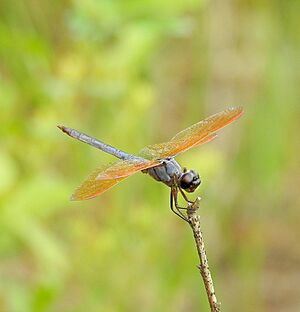Purple skimmer facts for kids
Quick facts for kids Purple skimmer |
|
|---|---|
 |
|
| Conservation status | |
| Scientific classification | |
| Genus: |
Libellula
|
| Species: |
jesseana
|
The purple skimmer (Libellula jesseana) is a special kind of dragonfly. It belongs to the skimmer family, which is a group of dragonflies. This dragonfly is found only in Florida, United States. It is considered a threatened species, meaning its numbers are getting low.
Contents
What Does the Purple Skimmer Look Like?
Adult purple skimmers are about 5 centimeters long. That's about the length of your pinky finger!
Male and Female Skimmers
Male purple skimmers have a cool blue color on their body, called the thorax and abdomen. Their wings are a bright orange.
Female purple skimmers can look like the males. But some females have a golden color all over. They might look just like another dragonfly called the golden-winged skimmer.
Where Do Purple Skimmers Live?
The purple skimmer lives only in a few places in Florida. You can find them in ten counties in the Florida Panhandle and the northern part of the state.
Protected Homes
One special place where they are protected is Mike Roess Gold Head Branch State Park in Clay County. Sadly, most other groups of purple skimmers do not have this protection.
Their Favorite Places
Purple skimmers like clear, sandy-bottomed lakes. These lakes usually have a plant called maidencane growing along the shore. Sometimes, you might also see sedges or St. John's worts there. Adult skimmers also need open woods or bushy areas nearby. They use these spots to find food.
What Do Purple Skimmers Eat?
Purple skimmer nymphs are baby dragonflies that live in the water. They eat almost any small creatures they can find in their watery home.
Adult purple skimmers fly around and catch insects. They use their excellent eyesight to spot their prey.
The Purple Skimmer Life Cycle
Adult purple skimmers are active during the day. Their whole life cycle takes about one year.
From Nymph to Adult
The young dragonflies, called nymphs, spend the winter in the water. Then, from mid-April to mid-September, the adults fly around.
Why Are Purple Skimmers Threatened?
The purple skimmer is in danger because its home is changing. This is mostly due to more people moving to Florida.
Habitat Problems
Many of their wetland homes are getting polluted. This pollution comes from things like septic tanks and fertilizers. This can cause too many nutrients in the water, which is called eutrophication. Also, too much water is being taken from the ground for things like watering crops. This is called groundwater depletion.
Competition for Survival
In places where their homes are damaged, the common golden-winged skimmer might take over. This makes it harder for the rare purple skimmer to survive. Experts think that the number of purple skimmers could drop by 30-70% in the future. Because of this, their conservation status is "Critically Imperiled," meaning they are in extreme danger.



